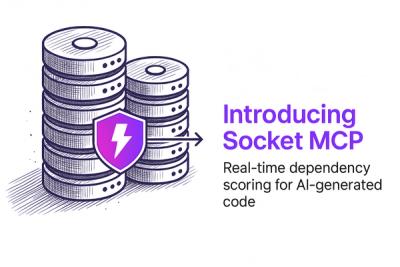
Product
Secure Your AI-Generated Code with Socket MCP
Socket MCP brings real-time security checks to AI-generated code, helping developers catch risky dependencies before they enter the codebase.
.. image:: https://img.shields.io/pypi/v/django-meta-mixin.svg?style=flat-square :target: https://pypi.python.org/pypi/django-meta-mixin :alt: Latest PyPI version
.. image:: https://img.shields.io/pypi/dm/django-meta-mixin.svg?style=flat-square :target: https://pypi.python.org/pypi/django-meta-mixin :alt: Monthly downloads
.. image:: https://img.shields.io/pypi/pyversions/django-meta-mixin.svg?style=flat-square :target: https://pypi.python.org/pypi/django-meta-mixin :alt: Python versions
.. image:: https://img.shields.io/travis/nephila/django-meta-mixin.svg?style=flat-square :target: https://travis-ci.org/nephila/django-meta-mixin :alt: Latest Travis CI build status
.. image:: https://img.shields.io/coveralls/nephila/django-meta-mixin/master.svg?style=flat-square :target: https://coveralls.io/r/nephila/django-meta-mixin?branch=master :alt: Test coverage
.. image:: https://img.shields.io/codecov/c/github/nephila/django-meta-mixin/master.svg?style=flat-square :target: https://codecov.io/github/nephila/django-meta-mixin :alt: Test coverage
.. image:: https://codeclimate.com/github/nephila/django-meta-mixin/badges/gpa.svg?style=flat-square :target: https://codeclimate.com/github/nephila/django-meta-mixin :alt: Code Climate
Version 0.2.1 is the last version ever of django-meta-mixin
All the codebase, features and documentation has been moved to https://github.com/nephila/django-meta and it will be released in django-meta 1.0.
django-meta 1.0 is a drop-in replacement for django-meta-mixin: an empty django-meta-mixin 0.3 package will be released together with django-meta-mixin to satisfy dependencies but all the following features and fixes will be released in django-meta.
django-meta-mixin provides a mixin to handle metadata in your models.
Actual data are evaluated at runtime pulling values from model attributes and methods.
To use it, defines a _metadata attribute as a dictionary of tag/value pairs;
tag is the name of the metatag as used by meta.html template
value is a string that is evaluated in the following order:
If value is False or it is evaluated as False at runtime the tag is skipped.
To use this mixin you must invoke as_meta() on the model instance
for example in the get_context_data().
Request +++++++
as_meta() accepts the request object that is saved locally and is available to methods by
using the get_request method.
Public interface ++++++++++++++++
ModelMeta.get_meta(request=None): returns the metadata attributes definition. Tipically these
are set in _metadata attribute in the model;
ModelMeta.as_meta(request=None): returns the meta representation of the object suitable for
use in the template;
ModelMeta.get_request(): returns the request object, if given as argument to as_meta;
ModelMeta.get_author(): returns the author object for the current instance. Default
implementation does not return a valid object, this must be overidden in the application
according to what is an author in the application domain;
ModelMeta.build_absolute_uri(url): create an absolute URL (i.e.: complete with protocol and
domain); this is generated from the request object, if given as argument to as_meta;
From PyPi::
pip install django-meta-mixin
From github::
pip install -e git+https://github.com/nephila/django-meta-mixin#egg=django-meta-mixin
#. Add to installed apps along with django-meta::
INSTALLED_APPS = [
...
'meta',
'meta_mixin',
]
#. Configure django-meta according to documentation
(https://github.com/nephila/django-meta#configuration)
#. Add meta information to your model::
from django.db import models
from meta_mixin.models import ModelMeta
class MyModel(ModelMeta, models.Model):
name = models.CharField(max_length=20)
abstract = models.TextField()
...
_metadata = {
'title': 'name',
'description': 'abstract',
...
}
#. Push metadata in the context using as_meta method::
class MyView(DetailView):
...
def get_context_data(self, **kwargs):
context = super(MyView, self).get_context_data(self, **kwargs)
context['meta'] = self.get_object().as_meta(self.request)
return context
#. Include meta_mixin/meta.html template in your templates::
{% load sekizai_tags %}
<html {% render_block 'html_extra' %}>
<head>
{% include "meta_mixin/meta.html" %}
</head>
<body>
</body>
</html>
Note
++++
For Google+ support you must add {% render_block 'html_extra' %} in your template to add object type definition. See relevant Google+ snippets documentation (https://developers.google.com/+/web/snippet/)
Example +++++++
Look at the example folder for a sample implementation.
django-meta-mixin currently supports the following properties:
Generic properties ++++++++++++++++++
Open Graph properties +++++++++++++++++++++
Twitter Cards properties ++++++++++++++++++++++++
Google+ Snippet properties ++++++++++++++++++++++++++
django-meta-mixin ships with the following object types for each set of meta tags it supports:
Generic / OpenGraph +++++++++++++++++++
You can override by defining META_OBJECT_TYPES/META_FB_TYPES nested
tuples in the project settings like::
META_OBJECT_TYPES = (
('Article', _('Article')),
('Website', _('Website')),
)
META_FB_TYPES = (
('Article', _('Article')),
('Website', _('Website')),
)
Twitter +++++++
You can override by defining META_TWITTER_TYPES nested
tuples in the project settings like::
META_TWITTER_TYPES = (
('summary', _('Summary Card')),
('summary_large_image', _('Summary Card with Large Image')),
('app', _('App Card')),
)
Google+ / Schema.org ++++++++++++++++++++
You can override by defining META_GPLUS_TYPES nested
tuples in the project settings like::
META_GPLUS_TYPES = (
('Article', _('Article')),
('Blog', _('Blog')),
('WebPage', _('Page')),
('WebSite', _('WebSite')),
('Event', _('Event')),
('Product', _('Product')),
('Place', _('Place')),
('Person', _('Person')),
)
Some of the above properties can be set either in the model or via settings paramaters
META_DEFAULT_IMAGE (must be an absolute URL)META_SITE_TYPE (default: first META_OBJECT_TYPES)META_FB_TYPE (default: first META_FB_TYPES)META_FB_APPID (default: blank)META_FB_PROFILE_ID (default: blank)META_FB_PUBLISHER (default: blank)META_FB_AUTHOR_URL (default: blank)META_TWITTER_TYPE (default: first META_TWITTER_TYPES)META_TWITTER_SITE (default: blank)META_TWITTER_AUTHOR (default: blank)META_GPLUS_TYPE (default: first META_GPLUS_TYPES)META_GPLUS_AUTHOR (default: blank)0.2.2 (XXXX-XX-XX) ++++++++++++++++++
0.2.1 (2015-10-17) ++++++++++++++++++
0.2.0 (2015-10-03) ++++++++++++++++++
build_absolute_url instead of make_full_url0.1.1 (2014-06-20) ++++++++++++++++++
make_full_url method to retrieve complete object URL.0.1.0 (2014-04-19) ++++++++++++++++++
FAQs
Social meta tags mixin for django-meta
We found that django-meta-mixin demonstrated a healthy version release cadence and project activity because the last version was released less than a year ago. It has 1 open source maintainer collaborating on the project.
Did you know?

Socket for GitHub automatically highlights issues in each pull request and monitors the health of all your open source dependencies. Discover the contents of your packages and block harmful activity before you install or update your dependencies.

Product
Socket MCP brings real-time security checks to AI-generated code, helping developers catch risky dependencies before they enter the codebase.

Security News
As vulnerability data bottlenecks grow, the federal government is formally investigating NIST’s handling of the National Vulnerability Database.

Research
Security News
Socket’s Threat Research Team has uncovered 60 npm packages using post-install scripts to silently exfiltrate hostnames, IP addresses, DNS servers, and user directories to a Discord-controlled endpoint.